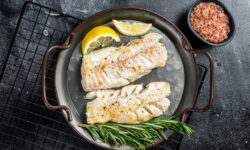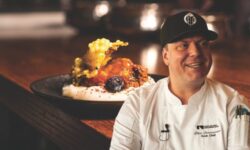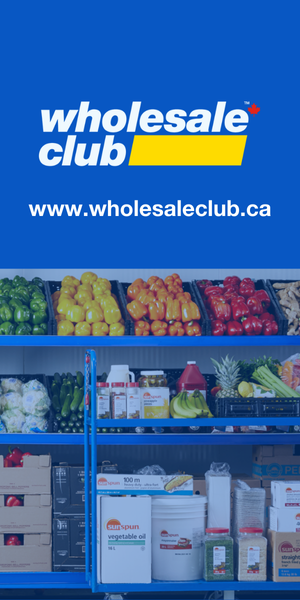A perspective on gratitude and food injustice for every Canadian from the extraordinary Chef Raquel Fox
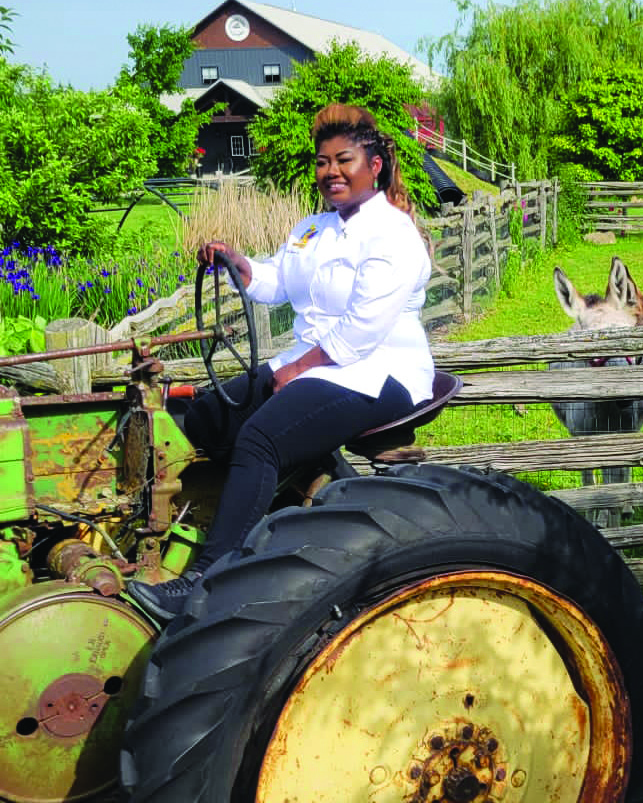
Award-winning Chef Raquel Fox, aka the “Island Gurl”, is the kind of person you wish you could be (or at least hang out with).
She projects a confidence and warmth that envelops you like a warm blanket on a cold night. Her speech is flavoured with certainty and a sense of gratitude and positivity that seems to stem from a lifetime spent listening to and learning from others, honed by examination of her own observations and experiences. She is the very personification of the value of faith in family, belief in lifelong education and a commitment to truth and joy.
Since immigrating to Canada from The Bahamas, Chef Raquel has made it her mission to put Bahamian and Caribbean cuisine on the map. As a young girl, she’d watched her grandmother transform her community through the food she prepared and shared and knew that food would play a central role in her future.
Years later, Chef Raquel has merged into the Canadian food conversation in many ways—as a professional chef, teacher, bestselling cookbook author, F&B innovator and media personality— infusing her cooking with signature dance and rhythmic movements that bring the dishes to life. Her successful line of Island Gurl sauces, available nationwide at Loblaw stores, define her cuisine: just the right amount of heat balanced with tropical fruits and vibrant spices. Here, she provides a gentle reminder of the abundance Canadians have at our fingertips and some loving (and overdue) criticism of how we feed each other in the country she has come to love and call home.
Nine years ago, we made the decision to immigrate to Canada. This was due to my son Rashad, who is on the autism spectrum. At just 18 months old, we were told he wouldn’t talk and would never do many of the things other kids do.
As a mother, I was upset. I got passionate, but more importantly, I became motivated to find a solution and prove them wrong. I thought, “Who are these psychologists to tell me this?” So, I did a lot of research and discovered that Rashad had talent as an artist and as a pianist—he can imitate classical music. One day, when Rashad was three or four years old, we were over at a friend’s house and a song played on the radio. Rashad went over to their piano and imitated the song note by note. He had achieved more than what the doctors said he could ever do, so I knew this kid was built for greatness.
During that time my husband and I were restaurateurs because food was always part of my DNA—growing up I called myself my grandmother’s sous chef. I was using a knife from five or six years old. Food was the centre of family for us. My grandmother was known as the woman who would feed the neighbourhood, and my family had had restaurant businesses before, so it was just so natural for us to get into the restaurant industry.
We opened the Wine Lounge in Nassau, Bahamas and it received rave reviews from USA Today magazine, rated in the top 10 best to visit in The Bahamas. Our concept was small plates and wine pairings, and my husband oversaw the wine distribution, bringing in wines from California, Canada and Argentina. Our marriage really complemented each other’s passions for food and wine. Of course, I was the chef and I designed and created the menu. We also did events at very prestigious places in the Bahamas—clubs like the Lyford Cay Club or the Old Fort Bay, which was home to many celebrities.
When Rashad graduated from school in Orlando, his speech pathologist—who was Canadian—said, “What are you going to do with him now? He’s just so great and you can’t just let him sit in The Bahamas where there are no resources for him. Canada is the best place for him. You can be a chef and have a restaurant anywhere in the world, so why not Canada, where your son would have a better quality of life?”
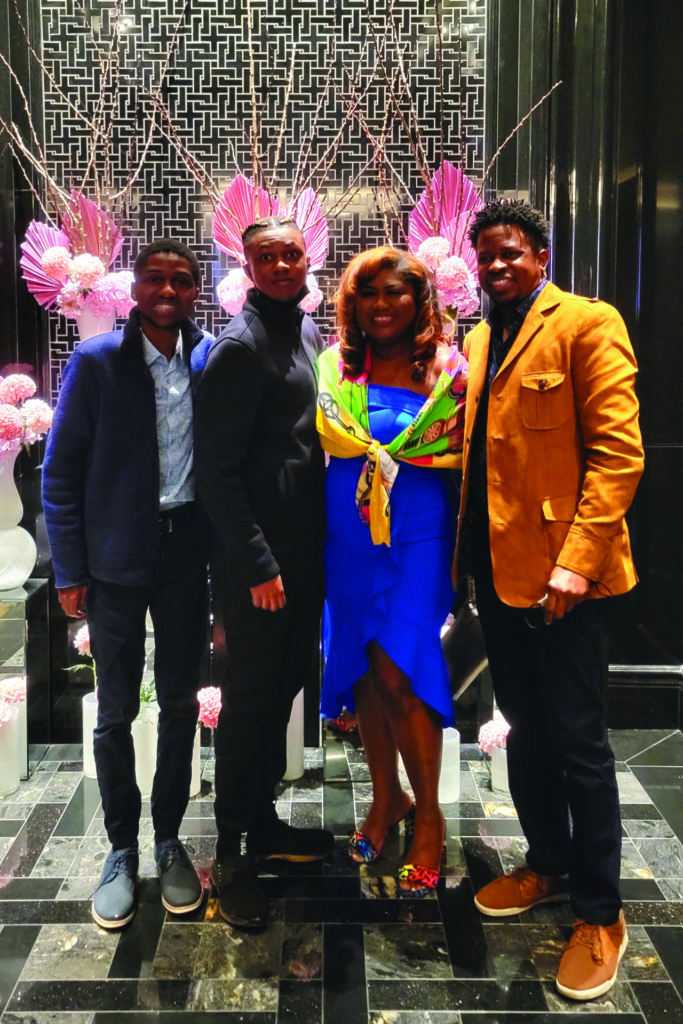
Being the mother that I am, in my heart I know that our kids are our legacy. We had to make sure that Rashad was okay. The universe spoke to me, everything came together and I said, “You know what, I am going to go to culinary school, perfect my craft and become the bad Mama Jama I know that I am.”
So we packed up, sold the home and moved on to Canada.
I enrolled in culinary school at George Brown College in Toronto and it wasn’t long before they knew I wasn’t the average student. I really wanted to just get in there, be quiet and become a sponge. I wanted to learn everything I could about French and international cuisines, and perfect my style of cooking. Right after I graduated, I was offered a job as a culinary instructor at the school. I designed the Caribbean course and taught at the school. I was also a coordinator at the PC Cooking School. Things really began to flourish for me.
Photo from Left to right: Rashad, Ruben Jr., Raquel and Ruben Fox
I started my cookbook, Dining in Paradise: A Food Lover’s Dream of Family Style Dining in the Bahamas, which was picked up by Whitecap Books. It was the first internationally published Bahamian cookbook in 30 years. I had a story to tell and I had a mission. I had a mission to pay homage to my grandmother and to show Caribbean cuisine deserves a seat at the table of fine dining. I wanted to prove that Bahamian and Caribbean cuisine wasn’t all just “brown food”, as I was told here, more than once. I’d share a catering quote and hear, “Hmmm…it’s only Caribbean cuisine—can you really charge that much?” I was upset about that. Like many cultures, in The Bahamas I was raised on family-style dining where we could all come together and enjoy beautiful platters of vibrant, tasty, delicious food together. Sunday dinners were a treasure—breaking bread and enjoying each other’s company was a form of mental health support. We all come from humble beginnings, and we all have what we call our “comfort food” that we elevate and now it’s at Michelin Star restaurants. Like Oxtail, for goodness’ sake—you can’t even afford that anymore.
My food photographer, food stylist and I really set out to showcase the range of Caribbean cuisine, to show that it fits in a fine dining setting and looks at home on restaurant-ready plates and crystal as much as it does in our grandmother’s homes on floral serving dishes. It deserves to be respected. We captured that.
The book launched so many other opportunities for me. I was voted one of Canada’s Top 25 Immigrants by Canadian Immigrant last year and just won the most outstanding female chef in Culinary Arts at the Waterfront Awards.
It’s been a wonderful experience. Rashad is doing well and flourishing here and there’s community, which I love, and it all ties in with food.
My grandparents were farmers, so I know the importance of eating locally and sustainably and how beautiful it is to just watch crops grow. There’s a real sense of pride in harvesting what you’ve planted and knowing that your cuisine isn’t harbouring any herbicides and pesticides—you want the produce with the little worms because that’s truly organic. My next cookbook will be a true celebration of seasonal produce and eating locally.
Growing up with farmers makes it easy for me to connect with local producers here. I work with many Ontario farmers, which is really what supporting local is all about. I’m a spokesperson and recipe developer for Foodland Ontario. Seeing a Caribbean recipe on the government’s website is such a beautiful thing to me because diversity defines Canadian cuisine. To see Caribbean food respected and shown to be healthy is powerful because that was another stigma against Caribbean cuisine: “Oh, it must all be fried foods.”
There are a lot of misconceptions that I was surprised by and now I’m constantly working on changing the narrative. Most seemed to just categorize all the Caribbean islands together, yet each one is unique. It’s not all just hot and spicy cuisine. It’s a constant challenge, but I’m having fun with it when I appear on television, speak on the radio or when I’m talking to people, I’m constantly showing how we have so many similarities, especially our history.
My niche as a celebrity chef is to talk about the history on our plates, and you’d be amazed by how that connects people. Viewers are constantly reaching out to me with similar stories about their ancestors. When I had just moved to Canada, I learned about how in Newfoundland and Nova Scotia they have the very-popular Blueberry Duffs, which are a steamed pudding. The Bahamian national dessert is called Guava Duff, which is very similar. We both inherited these from Europe, from the English Figgy Pudding; the concept of steaming bread or a roulade with fruits in it served with a delectable, luscious sauce.
The Guava Duff recipe is the heart of ancestral cooking, dating back to an 18th century colonist who taught this recipe to local Bahamians. My traditional recipe style focuses on the first settlers of The Bahamas, the Indigenous Lucayans, whose diets consisted of seafood, animal protein and root vegetables. Being able to share the history of Bahamian cuisine and all of its cultural influences on a regular basis reminds me of why I love this industry so much. It’s amazing how food connects and unites us, regardless of our differences.
Yet even with so much personal and professional growth, there’s work to do. Food insecurity is a topic that I’m passionate about. No one in Canada should be struggling with food insecurity, especially when people have so much. I would really like to see farmers of all ethnicities working together to eradicate it.
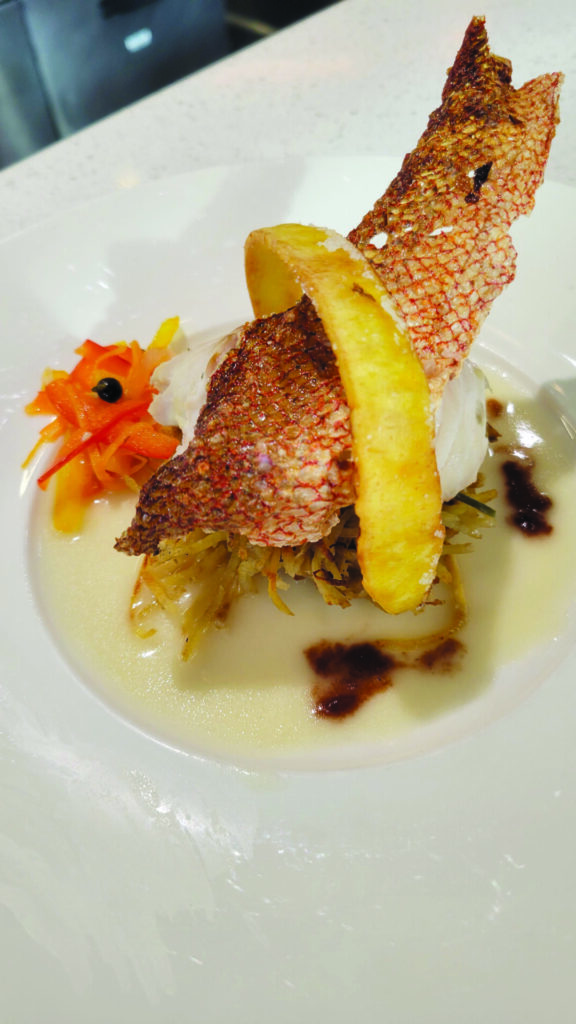
I really love what Black Creek Community Farm is doing right now under Chef Bashir Munye. There are very few farms in Toronto, and he has this wonderful initiative for feeding the community because everyone has a fundamental right to food. They’re really focused on getting people into education around how they can grow their own food. With such a huge diversity of Caribbean people in this country, especially in Toronto, we need to have our produce available in the markets as well,
instead of having to import it. There’s no reason why when farmers are planting their asparagus and potatoes that they can’t also plant Caribbean sweet potatoes, some callaloo, some okra—foods from our original country. The beauty of being Canadian is that Canada allows us to be both Bahamian-Canadian, Jamaican-Canadian or wherever we’re from. We want to see that reflected in the supermarkets; we would love to see some of our healthy, high-nutrient vegetables, roots and tubers as well. That’s what Black Creek is doing. Canadians are very supportive, so hopefully we will see greater ingredient availability in the community and more farmers really contributing to food injustice.
Every time I go on air I just preach about how important purchasing local is and how to look for Canadian agriculture symbols. It’s better for the economy and our health because when produce travels a certain
distance, it has been sprayed with certain chemicals to make sure it looks good when it arrives in the market. They’re picked when they’re too young, so they don’t contain the full nutrients and vitamins.
Educating people on the importance of buying Canadian, eating seasonally, and supporting local farmers really is my passion. I’m blessed to be able to do this work and I’m grateful for the opportunity to spread the gospel of good food.
Follow Chef Raquel Fox:
IG: @islandgurlfoods | islandgurlfoods.com





